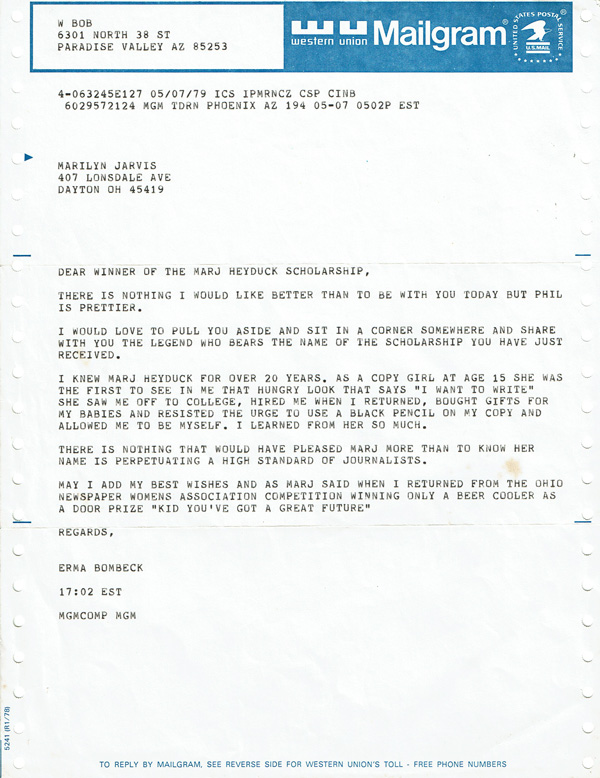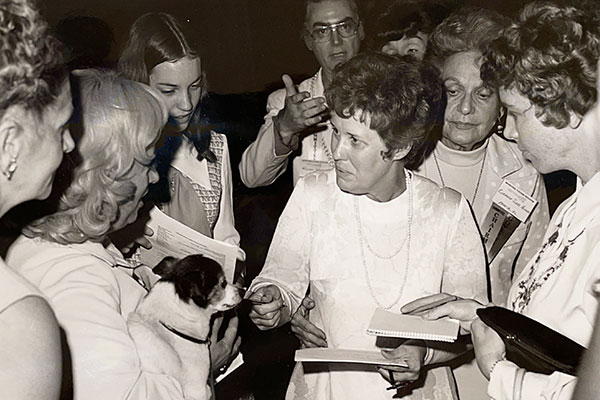Treasured telegram
When I was a young student journalist, I received a surprise congratulatory telegram from columnist Erma Fiste Bombeck ’49.

It was 1979, and I had just won a $500 Marj Heyduck scholarship from Dayton’s chapter of Women in Communications and welcomed the unexpected cash for tuition at Ohio University’s journalism school. Marj, as it turned out, was Bombeck’s mentor at Dayton’s morning newspaper, and Bombeck wanted to reach out to talk about her influence and give me a pep talk.
“I would love to pull you aside and sit in a corner somewhere and share with you the legend who bears the name of the scholarship you have just received,” she wrote. “I knew Marj Heyduck for over 20 years. As a copy girl at age 15 she was the first to see in me that hungry look that says ‘I want to write.’ She saw me off to college, hired me when I returned, bought gifts for my babies and resisted the urge to use a black pencil on my copy and allowed me to be myself. I learned from her so much.
“There is nothing that would have pleased Marj more than to know her name is perpetuating a high standard of journalists.”
For more than four decades, I’ve cherished Bombeck’s words — a reminder of the power of developing your own original voice as a writer. At the time, I had no inkling my life’s path would intersect time and again with this famous writer.
Early in my UD career, I worked with Bombeck when she served on the board of trustees on a video for a University of Dayton fundraising campaign and a direct-mail letter to prospective students. In 1991, I interviewed her for a University of Dayton Quarterly feature. After her death in 1996, I tapped into the creative energy of alumni and staff in the public relations office, and we launched a wildly popular biennial writers’ workshop in her name that draws hundreds of writers nationally.

Little did my 20-year-old self know that I would befriend Bombeck’s family and have the honor of working with them and UD’s librarians to help preserve her legacy as one of the great American humorists of the 20th century.
Last spring, a UPS truck rounded Frericks Way and delivered 78 boxes filled to the brim with Bombeck’s original manuscripts, columns, handwritten notes, speeches, articles and memorabilia. Housed on the campus she loved, the Erma Bombeck Collection in Roesch Library’s archives will be an invaluable, accessible resource to scholars, writers, students and fans. It is, in the words of one rare book collector, “irreplaceable.”
After spending hours in the archives happily poring through old letters and column ideas Bombeck jotted in longhand on legal pads and napkins, I asked project archivist Katie Jarrell about her impressions of the writer and why her writing endures.
“After going through box after box of Erma’s papers, I have found so many traits in her that are both relatable and inspirational,” Jarrell said. “Many people have written about her humble and authentic personality, and I’ve found this to be absolutely true while getting familiar with the collection. Her work and correspondence reveal a woman who was never lacking in personality, kindness, or determination. Sometimes I forget just how famous she was because she never comes across as haughty, snobbish or arrogant in any of her papers.”
“Sometimes I forget just how famous she was because she never comes across as haughty, snobbish or arrogant in any of her papers.”
This young archivist, who was born six weeks after Bombeck died, captured her immense appeal. She was unpretentious, self-deprecating, disarming — and authentic.
I remember a moment in 1988 when she took a break from a trustees’ meeting, sat in front of me and a videographer and, in one take, deliver an 83-second anecdote about how Brother Tom Price, S.M. ’11, her English professor first told her she had a gift for writing.
Her words still give me a chill — and make me laugh.
“So I must tell you, you sort of slide things under the door and wait until the great critic comments on them,” she said. “And he saw me one day outside the cafeteria and he said three words to me, that’s all, just three words that were to sustain me for the rest of my life, I think. He looked at me and said, ‘You can write.’”
Pausing, she quipped, “I won’t believe him. And then I thought, no, he’s a man of the cloth. I mean he’d have to be on his knees for the rest of his life repenting for this if he didn’t mean it.”
Bombeck had an uncanny knack for delivering the humorous zinger.
Unfolding that long-ago telegram, I laughed at her closing words: “May I add my best wishes and as Marj said when I returned from the Ohio Newspaper Women’s Association competition winning only a beer cooler as a door prize, ‘Kid, you’ve got a great future.’”
Teri Rizvi is executive director of communication strategies at the University of Dayton and a frequent contributor to University of Dayton Magazine, founded under her leadership in what we then called the PR office. She is author of One Heart with Courage: Essays and Stories. Teri received a master's in English from UD in 1990.